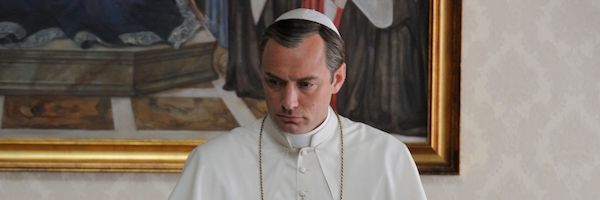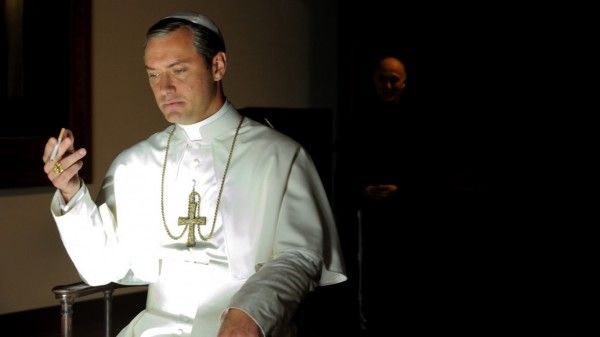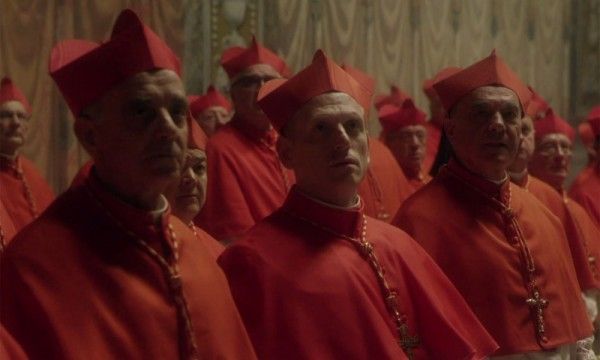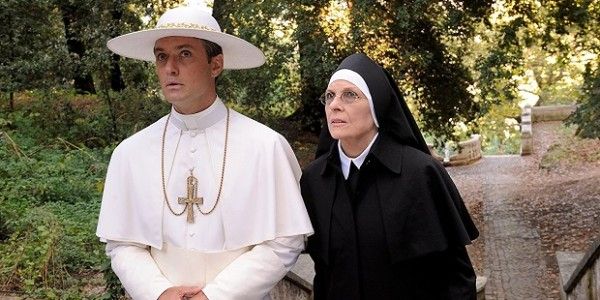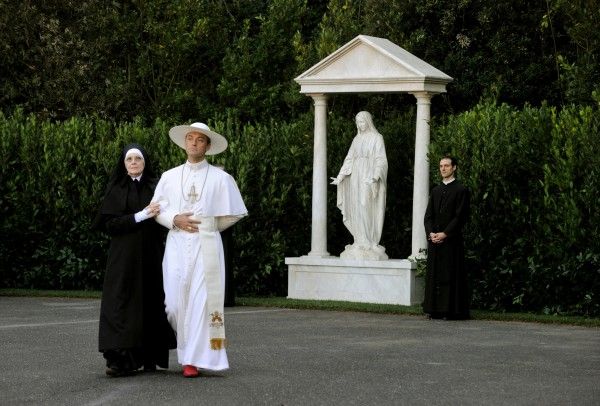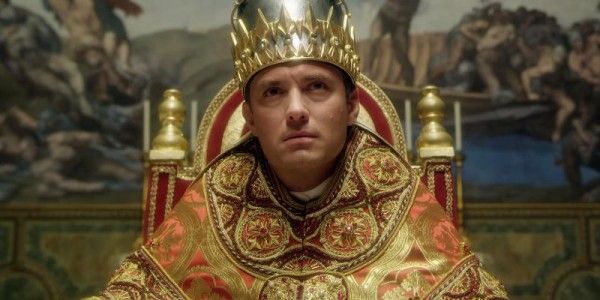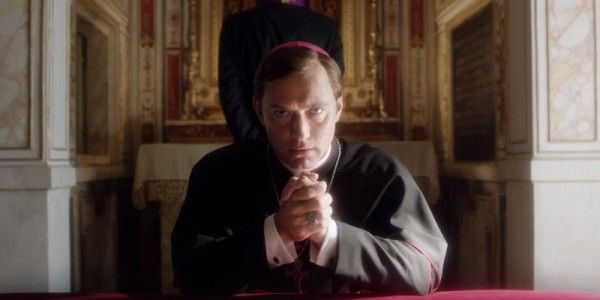One of the key scenes of Paolo Sorrentino's The Young Pope, his 10-episode miniseries set in the upper echelons of the Vatican, involves a business meeting between Lenny Belardo (Jude Law), the first American to be placed in the role of pontiff, and the head of marketing for the Vatican, played by Cecile de France. As the marketing director points out, much of the Vatican's budget comes from selling pieces of memorabilia with the pope's visage place prominently on them - ashtrays, key chains, shirts, posters, and whatever else you can think of to put a photo and price tag on. The new pontiff, however, is not interested in such gauche schemes and refuses to allow them to take a picture for mass production. The secrecy of his image and his identity, he explains, is an all-important element to his plans for his role as the most politically powerful religious leader on this spinning space rock.
Imagery in the Catholic church is something of a big deal, as you might have heard. In Martin Scorsese's blazing, sobering Silence, the main form of apostatizing - disavowing one's faith - is to spit or place one's dirtied hoof on an image of the Christ; the assumed punishment, in the afterlife, is a swift trip to the underworld. And Sorrentino is just as precious, meticulous, and ultimately rigid about his images in The Young Pope as Lenny, aka Pope Pius XIII, is about his likeness being offered up to the masses. In an early dream sequence, Lenny drifts through the main rooms of the Vatican before making a speech to his many followers from the famed balcony. There's a visual style being implemented in this sequence, as well as throughout The Young Pope, but the visual trickery is as ornamental as it is clever.
This, frankly, has been an issue with Sorrentino for some time. Though his stories have never lacked for a certain spark of innovation - this one included - the movies themselves feel stifling and overworked, gorgeous to behold but stuck in a sort of stylistic amber. There's something to be said about how such an overtly pre-ordained, exhaustively mapped out kind of vision would work as a crucial reflection of the rigid mandates and doctrines of Catholicism, but even if that's the point, it's one that is made early on and repeated without merciful end throughout at least the first half of the series. The director, who also wrote much of the scripts, never offers any fleck of visual impulsiveness, no moment that cuts to the antic inner life or, dare I say, soul of Lenny or any other character in the series' 9+ hours.
Everything feels completely thought through in The Young Pope, which clashes with its story of the upheaval of a tired system, either in the name of something completely new or frighteningly archaic. The show's writing introduces a vast cast of characters, including Sister Mary (Diane Keaton), the maternal nun who all but adopted Lenny, and Cardinal Voiello, the pontiff's unwanted right-hand man in matters concerning the church, played by Silvio Orlando. There's also Sister Mary's actual son, Cardinal Dussolier (Scott Shepherd), and Cardinal Gutierrez (longtime Pedro Almodovar muse Javier Camára), who carry out key elements to Lenny's plan for the church. And though these are roles with plenty of juicy lines and scenes to play, the script otherwise feels at a distance from both the endlessly complex political mechanics of the Vatican, as well as Lenny's much-derided American origins.
There's plenty of exposition in the series, detailing how Lenny was taken in by Mary and taught by Cardinal Spencer, played with grand tragedy and unresolvable hurt by the great James Cromwell, and how he came to plan his ascension, but it's all purely pathological. If Sorrentino's goal is to critique the dire falseness and pomposity of popularized religion and suggest an unpleasant future for the Catholic church, he has set out upon his duty with seemingly little understanding of how personal and messy faith can become and how that effects not only major events but tremendously intimate ones. His interest is seemingly the institution of organized religion first and foremost, but one gleans next to no curiosity for the history or the practical, day-to-day practices of the Vatican either in Sorrentino's abundant dialogue or his pristine yet turgid images.
If there is a passionate element in HBO's latest miniseries, it's only in its creators' attempt at convincing its audience of the audacity and brashness of its conceit, which is, to be fair, a hugely compelling and promising idea. There are attempts at facing up to the Vatican's more problematic stances and cover-ups, such as when we find out how Sister Mary came to be with child, but these remains almost exclusively on the surface, doled out as quick, painless talking points rather than seismic rifts that Catholicism created, expanded, and rarely is asked to own up to.
Much of Sorrentino's series, however, is simply focused on how outrageous Lenny's largely familiar conceptions are and how aghast other members of the clergy are at his insinuations, either out of pride or shame. Even the dream sequences, such as the pyramid of writhing, naked babies that opens the series, seem to insinuate liberation, madness, and anarchy without ever embracing the transgressive nature of such acts. In other words, The Young Pope is TV's equivalent of a dorm-room poster of Bob Marley blowing smoke or the Lenny Bruce mugshot: a depleted symbol of a radical reaction to society that finally most clearly represents the status quo.
Rating: ★★ - Oy vey
The Young Pope airs on HBO on Sundays at 9 p.m.

